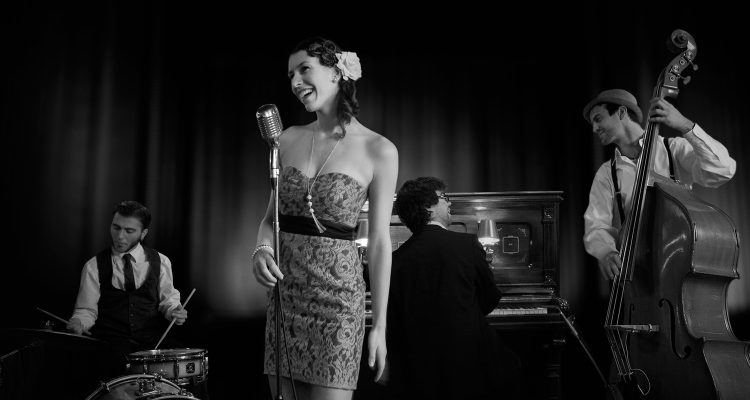By Gerry Griffith
Weelunk Contributor
The Minns Confectionary Feels the Loss of a Jazz Giant – Wheeling’s Chu Berry
Chris Cerone, the blind, balding 41-year-old musical genius who kept the patron “loafers” at Tom and Lizzie Minns’ South Wheeling confectionary regularly entertained on the store’s old upright piano with rambunctious boogie-woogie dance tunes, was glum and unusually quiet when he entered his friends’ establishment at 6 p.m. on Thursday, Oct. 31, 1941. Mabel brought him a bottle of his favorite pop and took him by the hand.
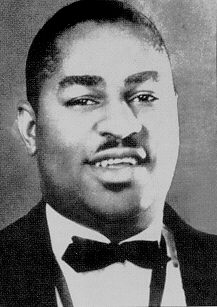
http://www.cabcalloway.cc/chu_berry.htm
“Come on, Mr. Cerone,” she said as the storeroom full of young people began to clap and whistle for their favorite piano player to begin the evening’s free festivities. “The gang’s been waiting for you.”
“I don’t know Mabel,” he responded. “I’m not sure I’m up for it tonight. Better give me a little more time. Chu Berry died last night.”
Chris, who lived in the YMCA on 20th Street and rode Wheeling’s buses and taxis to jobs tuning the pianos of Wheeling’s well-to-do, had known the Minns since their days together at the West Virginia School for the Deaf and Blind in Romney. He was only a second grader when Tom Minns was nearing graduation, but Tom and Lizzie, his future wife, had befriended the young New York City native and taken him under their protective wing. Because the school could be a rowdy place, Chris had always appreciated that mentorship.
Chris always referred to Tom as “the master planner.” Later, in the 1960s, Chris often told my brother and me the story about how our grandfather, Tom, cemented his legend at the school by exhibiting his planning skills.
“There was always a rivalry between the deaf boys and the blind boys,” Chris’ story would always begin. “They all shared the same locker room in the basement of the main building, and that’s where the deaf boys made life miserable for the blind boys. Almost every week there would be a fight. The deaf kids, who could obviously see, would grab the blind kids who couldn’t. Then they would deal out the rough stuff and beat the daylights out the blind kids. Your grandfather had had enough and came up with a plan like he always did. They had installed brand new electric lights in the locker room, and that was the only light in the place. Your grandfather got a janitor to show him where the light switch was. Then, he organized the other blind boys for the grand plan.
“One evening, things were shaping up for another showdown. Once he was sure things were headed for another thrashing at the hands of the deaf boys, your grandfather made his way over to the wall where he knew the switch was. Flipping it into the off position, he shouted out, ‘Now Boys. Give it to em.’ That’s when the blind boys, now at the advantage because they knew the layout of the room and could hear while the deaf boys could no longer see, started calling out to each other when they got a deaf boy cornered. The deaf boys couldn’t hear that and didn’t have any idea what was going on. Let me tell you the blind boys put a whipping on those deaf boys and that’s when the locker room shenanigans stopped once and for all. Your grandfather Tom was the master planner of that victory and graduated from school that year as the hero of all the blind boys.”
In the early 1930s, Tom and Lizzie persuaded Chris to give up his faculty job at Romney and pursue a new life in Wheeling, where he became an honorary member of their little family and the unofficial entertainer whenever a piano was near. But this Halloween night in 1941, there would be no entertaining.
“I’m sorry,” Mabel responded to Chris’ news about Chu Berry. “I can tell you are upset, but I don’t know who Mr. Berry is. He must have been very important to you.”
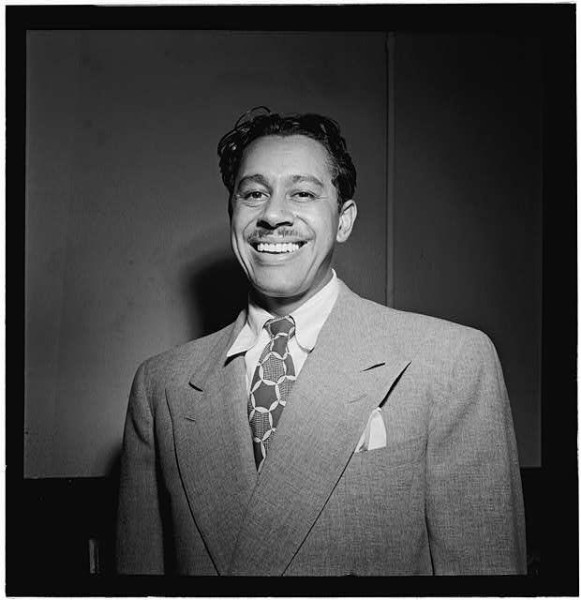
William P. Gottlieb – Photographs from the Golden Age of Jazz
Indeed Leon “Chu” Berry was important to Chris Cerone as he was to most versatile musicians of the 1920s and 1930s. And, he was from Wheeling.
Chu was born in Wheeling in 1908, and attended Lincoln High School. He had a musical family—his half-sister played piano in a jazz trio. When her little band rehearsed in the Berry house, he became inspired to pick up and experiment with the saxophone.
By 1928, Chu’s talent on the sax was turning heads. He joined “Perry’s Broadway Buddies” and played at hot spots on Wheeling Island at the old Henry Clay Tavern near West Alexander, Pa. Before 1930, he had worked his way into bigger bands and played dance halls in Columbus and Chicago before moving on to New York City’s jazz community. There, he played with Bessie Smith and Lionel Hampton and recorded once with Count Basie. Eventually, he became the featured sax player with the hottest jazz band in the world, the legendary Cab Calloway in his Cotton Club Orchestra. He was named to Metronome Magazine’s All-Star Band in 1937 and 1938.
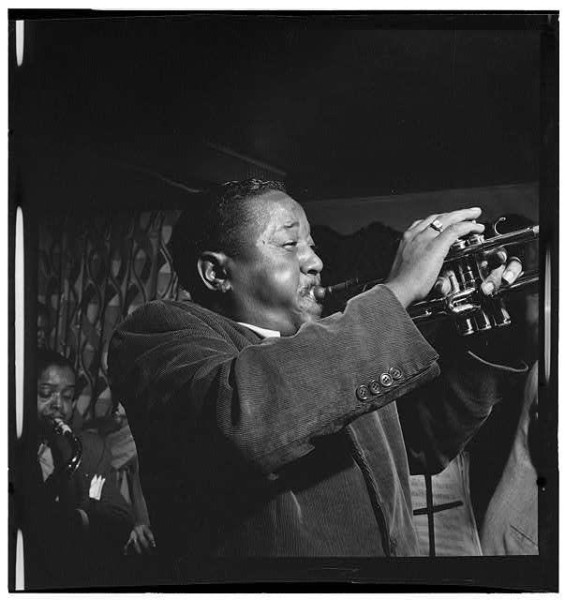
— Roy Eldridge (to John Chilton)
William P. Gottlieb – Photographs from the Golden Age of Jazz
“He was unbelievable,” Chris explained to Mabel. “I’ll play some records for you. (You, dear reader, can hear Chu’s magic by visiting this site) His solos had a swing and drive that I’ve never heard before from a sax player, and I’ve heard a lot of them. It was a style all his own, and it showed an imagination for melody that folks are beginning to copy. He was only 33. I can’t believe more of you kids don’t know him. He was the greatest sax player ever. And he was from your hometown.”
“How did he die,” Mabel asked.
“It was a car accident,” Chris responded. “He had a fractured skull and died last night.”
Chris heard the rustle of newspapers to his left.
“Hey, here’s something about him in the papers,” one of the loafers said. “I’ll read it. It says ‘Ob..obse..obseq’ something…”
“Obsequies,” piped up Lizzie, whose vocabulary was the envy of most folks who entered the little world of the Minns family. “It means burial ceremonies.”
“Okay,” continued the young man. “It says, ‘Obsequies will be conducted in Simpson Methodist Church Sunday afternoon at 2:30 o’clock for Leon (Chu) Berry, 33, native of this city and featured saxophonist with Cab Calloway’s orchestra, who was fatally hurt in an automobile accident near Conneaut, Ohio early Monday. Rev. Mapson F. Hayling, church pastor, will officiate, and burial is to follow in Peninsula cemetery. Chu Berry, as he was known, had been connected with prominent dance bands over a period of years. The Calloway orchestra had just completed an engagement at Conneaut Lake Sunday night and Berry and another member of the group were en route to Toronto, Canada, to fill an engagement when the accident occurred. Their car struck a stone bridge abutment during a heavy fog. Berry is survived by his wife, his mother, one sister, a stepdaughter, and a step-grandson. The body will remain in the Kepner Chapel until 2 o’clock Sunday afternoon when it will be taken to the church.”
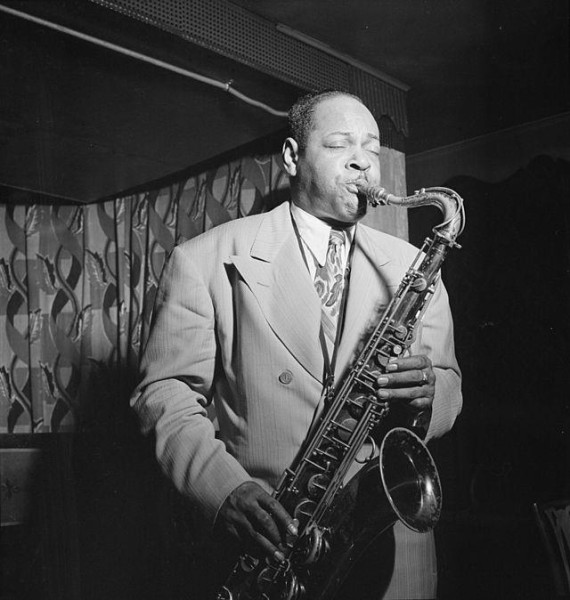
– Coleman Hawkins (to Dan Morgenstern)
William P. Gottlieb – Photographs from the Golden Age of Jazz
“That will be some event for Wheeling,” Chris observed. “I doubt if this town has ever seen anything like what’s going to go on here on Sunday. I bet Calloway himself will come for it. Wish I could be a part of it somehow just to pay tribute to Chu.”
Tom, the master planner, was quiet during the entire conversation about Chu Berry. He crouched and reached out with his right hand to pet his little dog, Pal, and rubbed his chin with his other hand. The gestures were a tip-off to Mabel that the master planner was coming up with another scheme.
“Kepner’s you say?” Tom asked.
Friday morning, Tom snapped a leash on Pal, grabbed his thin little bamboo cane, doffed his Fedora, and asked Mabel to straighten his tie. He was headed out the door on one of his mysterious missions. He headed south on Jacob Street and stopped at what he judged to be 3545 Jacob Street based upon his paces from the last intersection. He always kept count of city blocks and paces and had a dependable map committed to memory. Pal helped watch out for obstacles. The address was the home of Kepner Funeral Home’s South Wheeling branch, where one of Tom’s protégés from days gone by in one of his confectionaries now worked.
Saturday night, Chris showed up at the Minns and threw himself into his piano playing with an intensity that the loafers enjoyed, but had never seen before. Chris offered them a bit more than his usual repertoire of boogie-woogie and slow dance ballads. He introduced them to jazz and spoke eloquently between songs about the giants of the style. When he got around to talking about Chu Berry, his passion and love of the man’s musical magic was evident to all, and his voice cracked with grief and emotion when he noted the passing of Chu and the next day’s funeral event. The loss of Chu affected Chris as the loss of John Lennon affected my generation 40 years later.
When the store finally emptied at 10 p.m. and Chris put on his overcoat and picked up his heavy wooden cane to leave, Tom put his hand on his friend’s shoulder and told him to be back at the store at noon the next day and to wear his best suit.
“We are going to Chu’s funeral, but we have to be at the church well ahead of time,” Tom told Chris, who smiled and began to pepper Tom with questions. “Just be here at noon.”
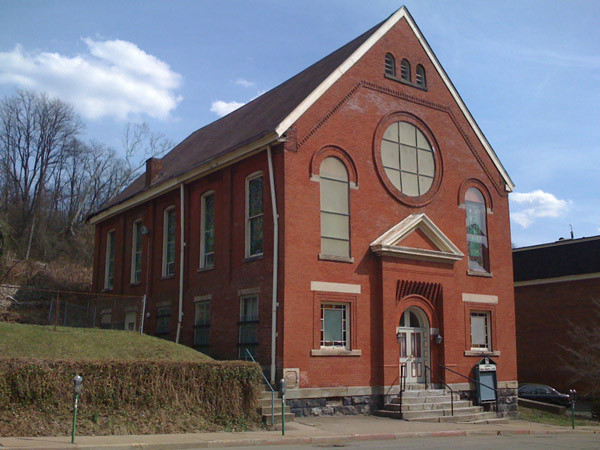
http://historic-wheeling.wikispaces.com/1000+Chapline+Block
At 1 p.m. Sunday, Tom, Chris, and Billy, a young volunteer from Tom’s squad of regular loafers ascended the steps of Simpson Methodist Church on Eoff Street, both with their canes in one hand and their hats in the other. They were early enough to avoid the massive amount of mourners who had descended upon Wheeling for Chu’s services. Tom’s friend from Kepner’s led them to seats midway down the aisle that he had saved at Tom’s request. Tom and Chris sat in one row on the end, and Billy sat in the row in front of them and positioned himself so that he could turn and describe the room to them.
More than a thousand people had filed past Chu’s casket at Kepner’s to pay their respects before making their way to Simpson for the service. They filed in solemnly, and Bill whispered to Tom and Chris whenever he saw something interesting. When Cab Calloway himself strode in with most of his band behind him, Billy excitedly described the scene. Chris was on the edge of his seat taking in the sound of the room and Billy’s descriptions. The trio was among the very few white faces in the crowd.
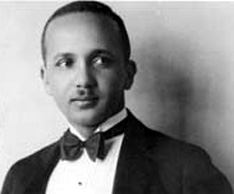
— Fletcher Henderson
http://en.wikipedia.org/wiki/Fletcher_Henderson
There were gospel and jazz tunes played, and Rev. Hayling delivered an eloquent homily about making a joyful noise unto the Lord. According to Billy, Chu’s casket was covered with white lilies that the newspaper reported later were ordered by Cab Calloway himself while his band contributed a massive floral arrangement in the shape of a heart that stood behind and to the left of the bier. There were hundreds of other flowers lining the sanctuary. The smell of the flowers was intoxicating to Tom and Chris, whose senses were acutely sensitive to aromas.
Finally, Cab Calloway himself stood at the pulpit to speak of his friend Chu Berry. He emotionally told the overflowing church that Chu had been like a brother and that the big man had charmed the world with advanced harmonies and smoothly flowing solos that would influence musicians for generations to come.
“Chu will always be a member of our band,” Cab said. “He was the greatest.”
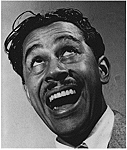
— Cab Calloway
William P. Gottlieb – Photographs from the Golden Age of Jazz
More than 100 vehicles moved through the streets of Wheeling as part of the funeral procession that escorted the hearse with Chu’s body south to Wheeling’s Peninsula Cemetery where he was laid to rest. (According to Findagrave.com, “In 1964, part of Peninsula Cemetery was excavated to make room for the I-70 Wheeling Tunnel thoroughfare. Berry was among those who were moved from Peninsula Cemetery to Mt. Zion Cemetery. Today, he rests in an unmarked grave in a grassy knoll section of Mt. Zion that accommodated those moved from Peninsula Cemetery.”) Chris, Tom and Billy made their way back to Tom’s store without talking.
“This meant a lot to me Tom,” Chris said at the end of their walk home. “I never know how you make these things happen, but I’ll always be grateful to you for today.”
Tom just smiled and patted the shoulder of his old friend.
“Let’s go inside,” he said. “We owe Billy about 10 bottles of pop.”
Chu Berry’s legend lived on. There were saxophones named after him that generations of players enjoyed. Greats like Dizzy Gillespie and Charlie Parker (Parker named his son “Leon” after Chu.) readily admitted his influence on their work. Cab Calloway, who continued to perform until his death in 1994, always paid tribute to Wheeling’s Chu Berry as one of the greatest sax players of all time.
Listen to what NPR Fresh Air music reviewer Kevin Whitehead had to say about Chu, and catch a few musical glimpses from a boxed set of his recording sessions released in 2012 here. There is a good bio of Chu Berry and a listing of all his early recordings here.


